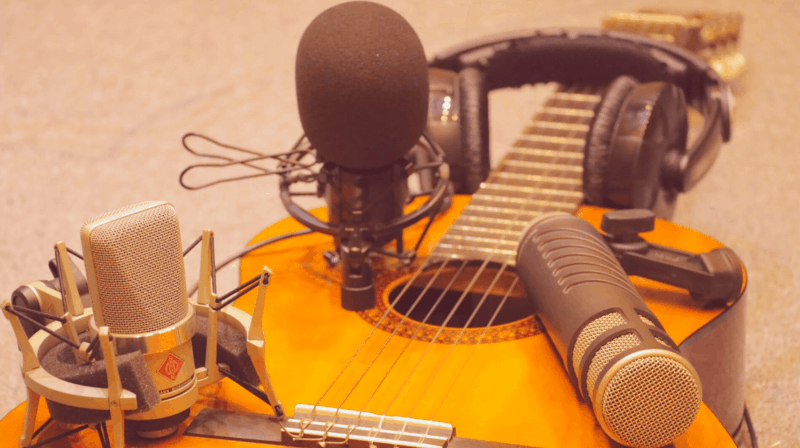
Whether you are just getting started in audio recording or you’ve been at it for a very long time. It’s in everyone’s interest to stretch their money as far as they possibly can. For that reason we are going to talk about buying used recording gear. That’s an idea worth considering. So if you’ve just begun your collection, this is your for you.
In order to get this discussion started let’s use microphones as an example. Any recording enthusiast worth their grain of salt loves to build their personal collections of usable microphones. So it’s important to find cost effectives ways to acquire the gear you need (or want). But, Is buying used recording gear and microphones safe?
Yes, buying used recording gear and microphones is safe. In order to be successful in your purchase make every effort to inspect the microphone in advance. If purchasing sight-unseen, gravitate towards sellers who will provide a short-term guarantee to allow for inspection upon delivery.
Now let’s delve into the reason why. After that we’ll discuss some approaches to finding the gear you’re looking for and how those approaches work.
Quality built second hand gear in good working order is always of value. Perhaps more valuable then you thought, just look at vintage gear for instance.
Vintage Gear
I want to discuss vintage gear early on as a case in proof. Maybe you are so new to this field that you are not aware that some pieces of vintage gear are very desirable. In fact some pieces are so sought after it actually increases in monetary value.
Some producer in some room somewhere wants to use a specific piece of gear. It may be a certain synth, microphone, dynamic processor, pair of reference monitors or rack mounted channel strip. Whatever it is, that item is no longer in production. So they scour the Internet, reach out through their network of friends and associates looking for that particular item. When they finally track it down you better believe they are buying used recording gear.
It is understood that value of vintage gear is not exactly comparable with the premise of this article. But, it illustrates a point. The point is that buying, selling and trading old, used, second hand, and even vintage gear is common place.
You should do your utmost best to qualify all of your purchases. That way you can feel entirely comfortable with buying and operating used equipment.
Now that we’ve established that vintage gear can be a desirable commodity, let’s move along to our topic. Let’s get to the discussion on about purchasing (non-vintage) effective second hand gear.
Second Hand Acquisition
Once you feel comfortable buying used recording gear, you need to determine what you need. To do that assess all of the gear you have. Then list the gear you haven’t but require in order to record professionally and to justify charging money to clients.
I recommend creating a target list in order of importance. Have the list range from the items of highest necessity to those luxury items you could perhaps live without.
Start Hunting
Start by tracking down each piece, one at a time. Work your way through the list by identifying all of the potential solutions for each.
An example can be made with microphones. Different microphones are intended to capture different sources. They are designed for different purposes. You will need to know the speciffications of each second hand microphone you find for sale. That is to be sure you are purchasing one that best suits your need.
Each manufacture may produce a number of products for a various task. When you are searching used, you never no what you may stumble across. So be ready to do a quick internet search of the specifications and you’ll be set. That way you know how the gear can be used, and whether that is worth spending your money on or not.
Cost-Value Analysis
That leads us to cost-value analysis. Any time we make choices there are always trade offs. We loose something here and gain something there.
Keep in mind the rule of opportunity cost. The rule of opportunity cost simply says that by making one choice; you’ve lost the other potential options.
This awareness is necessary to clearly assess what you’re doing. That way you can be sure that you’ll be satisfied with whatever you’re choosing. Once you’re confident with your decision. make the purchase and mark the item off of your checklist and into your inventory.
If it happens that a potential solution appears out of order on your checklist, that’s fine. Roll with it. If you feel compelled to make the purchase, weigh the cost-value of doing so and make your decision.
Be sure that by making the purchase you haven’t compromised your greater good or best interest. If you have not, mark the item off of your checklist and into your inventory.
Gear That Could Be Purchased Used
In these days everything is so computer centric. In the world of recording and through the miracles of processing power we can do any number of wonderful things inside the box. All of that doing previously required a myriad of gadgets and external devices to accomplish.
That is fantastic for us, especially because it really eliminates the barrier of entry. Without those computing devices and their fanatical processing speeds there would be no such thing as recording as an enthusiast’s pastime. It would be otherwise cost prohibitive.
That said there is never enough money and while things have become a lot more affordable, they still aren’t free. There is never any shame in being frugal.
Save money where you can.
Here are some pieces of hardware that you’ll need to pick up in order to run your session. This gear could be purchased second hand.
- Headphones
- Microphones
- Studio Monitors
- Computer
- Audio Interface
- Preamps
- Compressors
- Channel strips
- Mic stands and accessories
As you can see it’s everything, or rather anything. Almost anything you need could be purchased second hand and that is a good thing to keep in mind.
Building Inventory
In order to get started you’ll gradually need to build an inventory of gear. That is necessary to be able to start selling billable time to clients at your studio.
Start making strides towards filling up your microphone closet by searching through second hand bins where and whenever possible.
The gear you need may vary to some extent depending on the genre of music you are interested in producing. But certain pieces of gear will be desirable to everyone regardless of genre.
Someone who wants to track drums will need a few more microphones than someone who is focused on EDM or Hip Hop. But both producers could certainly make use of good vocal mics and pre-amps as well as other items.
Start by targeting the items you’ll need to use on the various instruments that you regularly intend to be tracking. Then narrow your sights in on finding those items.
You are going to be looking for items that are well working. Slightly worn is fine, but be sure to make every opportunity to test the item in advance of purchase. If you are not in a position to test the item for yourself; buy with some sort of guarantee return window.
Second Opinion? Ask To Have The Gear Evaluated
If when buying used recording gear, the gear is especially valuable you may consider having it looked at by a technician. They could answer any questions in regarding functionality or remaining lifespan of the item.
To do so you’ll need to make an arrangement with the seller. You’d ask to have the item inspected by a certified technician of some sort. This may be useful If the item doesn’t come with a guarantee.
This strategy would be for a more expensive piece of gear of course. Having the gear evaluated could give you some piece of mind. Especially when dealing with a substantial amount of cash.
If the item is being purchased with a guarantee having it inspected is irrelevant.
If the item is not geographically near by. you may still be able to coordinate its inspection. But you can expect that managing that organization will involve a lot of moving parts. That said, be sure you’re serious about the purchase.
Double check with yourself as to whether it is a must have piece. If it is and the item is too difficult to substitute it maybe worth getting the reassurances you need.
Leap Of Faith (THIS IS NOT A RECOMMENDATION)

There are cases when we all take a leap of faith. Moments when we must go out on a limb. I for one have bought things on great reaches of trust. As a rule I do my best to avoid doing so. But there are times when you gamble????.
In one instance more than a decade ago I was looking for a Tascam us2400 to control my DAW. That item had already been discontinued and there was no way to purchase it new. After I’d exhausted all possibilities of finding one. I had a notion to search craigslist nationwide.
Think Out Of The Box
To do so I used Google’s search field to type “CRAIGSLIST and TASCAM US2400”. The search resulted in one listing half way across the country. It was the only one available I’d found. So, if I wanted to have it I was going to have to take a leap of faith.
I contacted the seller and did my best to read the situation on a gut level. So, I decided to go for it. I explained to the seller my situation and asked if they’d mind to make arrangements to ship it to me. The seller responded with the total cost including shipment.
Managed Risk
Before I sent the cash I had to be sure I wasn’t going to be devastated if the seller had been a cheat. In this situtatino the cost of the gear wasn’t too bad, and the value of having the gear outweighed the risk.
So I transferred the money.
luckily the item did arrive as described. I still have it today, and while it has been replaced in my studio, it is still in the same working order it was when it was purchased.
I don’t recommend that you take a financial risk. But if you needed a piece of gear, and you can mitigate the risk maybe you can find a way too.
Resources For Finding Used Microphones And Other Used Gear
Of course there is eBay, which is hit or miss. With eBay you must compete with others and wait patiently for auctions to end. In many cases you’ll do so only to be outbid at the last second.
The benefit of eBay is that there are often buyers protections described into the sale. There are also times where they are not, so be sure to pay attention to the details.
In my experience, I have used eBay to great result. I purchased a second hand Neumann TLM 103 condenser microphone a few years back. Most recently I purchased a pair of used Yamaha HS5s to sit next to my Adam A7s for A/B monitor comparisons during mix-down.
So, Despite some of my frustrations with investing time to wait out auctions, eBay can be very useful.
Craigslist can be a much more direct means of finding what you need. The problem with Craigslist is that as it comes with geographically advantages and disadvantages.
If you reside in a community that is famous for music like Nashville or Austin you’re good. You’ll find a lot of gear posted for sell in those types of place. Somewhere else further removed from a thriving music scene and you may not find as many good posts.
Big Box Stores
Some of the big box music stores take second hand buy-ins for credit. Keeping a regular eye on their inventory can be a great way to find a gem. Sweetwater also has second hand gear listed on their website.
Pawnshops
One of my favorite places for buying used recording gear is a pawnshop. Pawnshops are cool because they have piles of interesting things to sort through. In addition to being able to test the gear, they often have layaway as well. I looked online while writing this and one of the shops I used to visit to rummage for gear was Cash American Pawn. They seem to have a nationwide app that you can download to search inventory.
Rental Companies
Most rental companies that lend gear will have in house technicians to perform regular maintenance on their inventory. So while this gear may have been handled more heavily it will have also have been up kept. In some instances these companies clearing or change their inventory. If that happens you may stand to find something useful at a reasonable cost. Search in your area for companies doing pro audio rentals as well as online. Make a few calls or send a few emails and see what comes of it.
In Conclusion
Having the right microphone for the job is really what this all comes down to. The longer you’re involved in recording the more at peace you’ll come with idea of needing so many.
All kinds of people collect all kinds of things. So, as long as that’s the norm then why not collect microphones and gear. That said, If you were ever going to have a collection of anything, then what is cooler to collect.
Just take it one step at a time. With one acquisition after the next your collection will gradually grow. Hopefully that growth will be in correspondence with your level of skillfulness in using all of these items. Feel comfortable in purchasing second hand gear. Start to think of your self in the same way as any other collector searching for treasures.
Do your best to practice thoughtfulness when buying used recording gear. This is in order to better manage and mitigate your risk. In a lifetime of buying second hand you will inevitably get burned once or twice. But, so long as those occasions are averaged into the countless times you win you’ll be ahead. Good hunting!
Now go and get to it.
Good luck!
